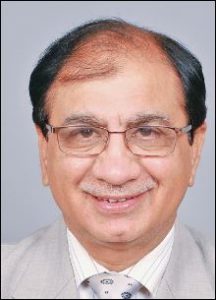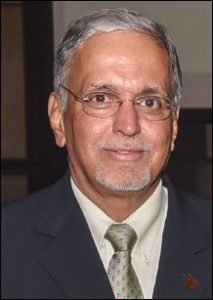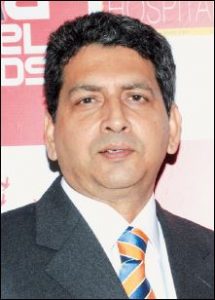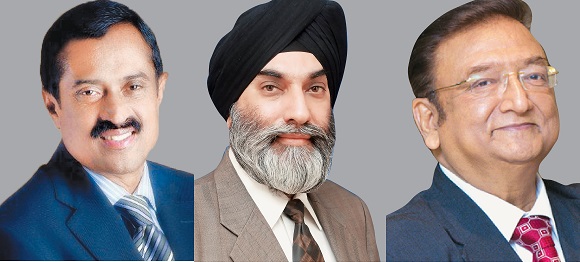The Goods and Services Tax (GST) came into effect in July 2017 and shook the entire travel industry. While many said that it simplified processes, others believed that it deviated from the ‘One nation One tax’ idea.
TT Bureau
EM Najeeb, Senior Vice President, Indian Association of Tour Operators
“A lot of positive changes have taken place after the implementation of GST in the country. As far as the tourism and hospitality industry is concerned, a lot more has to happen in the coming days. Both IATO and the Ministry of Tourism are working to take the issues to the GST Council and Finance Ministry to avoid multiple taxes known to tour operators and transport operators. We are very hopeful that we can find solutions for these issues very soon to resolve the confusion around GST.”
Guldeep Singh Sahni, Immediate Past President, Outbound Tour Operators Association of India
“GST is a great system brought in haste without training and development. While 5 per cent GST on tour operator services was a welcome move by most quarters, the government must separately deal with inbound and outbound tour operator services. Outbound tour operators are impacted in a big way in competition with internet bookings where one does not have to pay any GST. Overseas bookings for only hotels are also impacted due to GST. GST should be implemented on our service charge and not on services produced and delivered in another country.”
Subhash Goyal, Hony Secretary
“FAITH2017 was not a very good year for tourism as most of the industry was trying to recover from demonetisation and the implications of GST. We would like to get the input credit on the GST being charged by other service providers to tour operators. We have also asked the government to exempt GST on all foreign exchange earned from international tourists. With some issues of GST having been resolved, I still feel that the taxes on five-star hotels are quite high which is making the Indian tourism products more expensive than the neighbouring countries.”
GST needs to be simplified: Trade

Chander Mansharamani, Vice Chairman, India Convention Promotion Bureau (ICPB)
GST has made a big impact on international conferences. This has affected the business where most of the foreign organisations don’t want to pay the GST. Right now, they cannot take the input tax credit at the moment. However, good news is that Ministry of Tourism is working on that, because we at ICPB, have given them a background on how this business has affected us. I hope they come out with a solution for our woes with GST and work towards rationalising it.

Sameer Karnani, Travel Agents Association of India (Western Region)
While there is still a lot of confusion in the minds of many, we who are part of the travel trade have definitely understood and adapted GST into our business. It was really a challenge with a lot of uncertainty about GST where apart from the trade even the consultants had different views on various things. It was a difficult process rife with confusion but some presentations by TAAI cleared some myths and doubts about GST. Today, based on the knowledge that we have received in the last one year through various platforms, we feel we are ready for it.

Sampat Damani, Founding Partner, Disha Travels
“GST has completed one year but regrettably there is still not much clarity for us in the travel and tourism industry. Our industry is quite complex; we provide multi-faceted services which are sourced for our clients and each service has its own uniqueness. Those complexities still exist which lead to double and treble taxation, thereby defeating the fundamental purpose of GST: One Nation One Tax. Honestly, each one of us is still groping in the dark. We still believe that we have got it right. I sincerely wish that the department sits with us with the right approach and attitude.”

Sanjay Narula, Vice President, Travel Agents Association of India
“GST still needs proper implementation and not everyone in the industry can claim that he understands how it can prove to be a major benefit for the tourism and hospitality industry. The process to claim and avail input tax credit is clear with some adjustments and government support. GST increases costs and compliances for the taxpayer, especially the business owners. Domestic air travel has clearly seen a boost post GST with air prices reducing. GST is a great reform but we need to work closely with the government and stakeholders to ensure we have the entire benefit to help the industry to leapfrog to higher growth.”

Debjit Dutta, Chairman, IATO West Bengal Chapter
“GST is a good initiative. Since multi-level buying and selling is involved in travel trade, the process becomes slightly complicated for a stakeholder. GST has to be simplified for tourism as most stakeholders are small and medium operators. With a complex structure in terms of business transaction, customers shouldn’t end up paying more taxes. However, the input tax credit allowed for tour operators is a welcome move. GST should be made user-friendly not only for the stakeholders but also for end users.”

Himmat Anand, Founder, Tree of Life Resorts & Hotels and Tree Leaf Hospitality
“GST is a great step. For the hotel industry, there is now 18 per cent and 28 per cent slab. The 18 per cent slab is very fair. The issue is with the 28 per cent slab because some of our hotels come under it and that is extremely unfair. It suddenly pushed our whole product price, making it around 15 per cent more expensive of what it was pre-GST. I am also told there is a review committee sitting to discuss GST rates soon. I hope that the government will bring a flat 18 per cent GST for the hospitality industry instead of 28 per cent. It would give a huge boost to the sector.”

Deepak Bhatnagar, Managing Director, Aamantran Travel
“In terms of our business, GST has made a negative impact. The main issue is that a lot of things are still not clear. There is a lot of ambiguity on certain aspects of GST. Until that gets cleared, we cannot assess the impact of this regime entirely. It was said that GST is one tax but the same is not the case. In fact, it is not at all true for the tourism industry. We are paying tax on tax, and this is what the GST Council should look at and resolve the problem. I hope the industry gets its due soon.”

Anjum Lokhandwala, Founder & Director, Outbound Konnections
“Before GST was rolled out, the tourism industry was liable to pay multiple taxes. With one nation, one tax— GST, the cost of the land packages in India have reduced to quite an extent. As we move forward, enough time has been provided by the government to understand and file the returns. Regular updates and many conferences in India were arranged to satiate the queries and problems. Moving forward, the systems are easy to follow now. With uniform rates and better use of input credit, the cost for the end users have reduced. India is taking baby steps in digital implementation of the taxes.”

Nishith Saxena, Founder & Director, Cruise Professionals
“One year of GST has surely been a rollercoaster ride for most people in the business. Since correct invoicing and application is the key in GST, it automatically disciplines all businesses up and down the line. For cruise business as well as other outbound businesses, the products being sold online and overseas are available to passengers at the same price, hence it is a bit difficult to remain competitive under GST regime. I guess, businesses would have to live with the complexity of such tax regimes as the tax base needs to increase dramatically for government to reconsider further rationalisation of GST rates. Till then we all need to control costs, be extra efficient and continue to grow.”

Vishal Suri, Managing Director, SOTC Travel
“At SOTC, we have observed that the GST tax structure has rationalised and simplified travel costs. Since we were prepared for the roll out of GST, we faced lesser concerns while implementing it. This tax structure has brought in simplicity from a customer perspective as there is a flat 5 per cent GST on all tour packages. Since travel packages qualify for this rate without input credit, hassles related to avail credit are minimal. There is also a flexibility of charging GST, based on commission or base fare model on air travel. The GST structure has given an impetus to the domestic travel sector, since it allows credit of GST paid on the purchase of domestic tour packages. However, the filing process is too cumbersome and should be simplified. The tech infrastructure administering the GST also needs improvement.”

Mahesh Iyer, CEO, Thomas Cook India
“While the road to ‘One Nation One Tax’ has been a challenging one, the significant achievement must be acknowledged in this year of GST implementation. The government has put in strong efforts to address various issues including frequent amendments, clarifications and IT related concerns. Considerable intervention is yet required to bring GST to its full efficiency as it continues to evolve. Despite the multiple continuing challenges of adapting to GST across the ecosystem and the cumbersome compliance process due system challenges from GSTN, our core travel businesses have delivered strong results, thanks to our focused initiatives of not just growing volumes and productivity but also enhancing margins.”

Garish Oberoi, President, FHRAI
“Before GST, we were hopeful that all our worries would go and the multiple taxes would fade away. However, GST came with multiple slabs for the hospitality industry. We have been telling the ministry that all our source markets are at 8 per cent and we should be kept in that slab only. However, with the mechanism of reverse charges and input credit, we realised that 12 per cent may be a rational thing with 2-3 per cent input tax credit. Today, the 28 per cent GST on hotels is making Indian hotels expensive. We did get a few concessions in the restaurant industry but we hope that something is done for the hotels as well.”
 TravTalk India Online Magazine
TravTalk India Online Magazine





